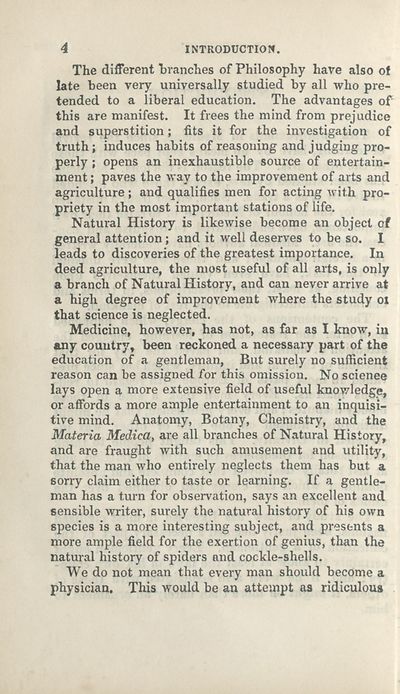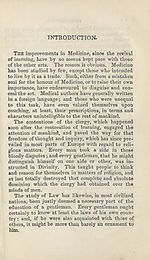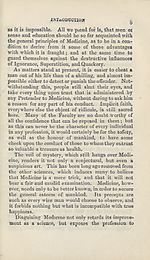Diseases > Domestic medicine
(18)
Download files
Complete book:
Individual page:
Thumbnail gallery: Grid view | List view

4 INTRODUCTION.
The different branches of Philosophy have also ot
late been very universally studied by all who pre¬
tended to a liberal education. The advantages of
this are manifest. It frees the mind from prejudice
and superstition; fits it for the investigation of
truth; induces habits of reasoning and judging pro¬
perly ; opens an inexhaustible source of entertain¬
ment ; paves the way to the improvement of arts and
agriculture ; and qualifies men for acting with pro¬
priety in the most important stations of life.
Natural History is likewise become an object of
general attention; and it well deserves to be so. I
leads to discoveries of the greatest importance. In
deed agriculture, the most useful of all arts, is only
a branch of Natural History, and can never arrive at
a high degree of improvement where the study ot
that science is neglected.
Medicine, however, has not, as far as I know, iu
any country, been reckoned a necessary part of the
education of a gentleman, But surely no sufficient
reason can be assigned for this omission. No science
lays open a more extensive field of useful knowledge,
or affords a more ample entertainment to an inquisi¬
tive mind. Anatomy, Botany, Chemistry, and the
Materia Medica, are all branches of Natural History,
and are fraught with such amusement and utility,
that the man who entirely neglects them has but a
sorry claim either to taste or learning. If a gentle¬
man has a turn for observation, says an excellent and
sensible writer, surely the natural history of his own
species is a more interesting subject, and presents a
more ample field for the exertion of genius, than the
natural history of spiders and cockle-shells.
We do not mean that every man should become a
physician. This would be an attempt as ridiculous
The different branches of Philosophy have also ot
late been very universally studied by all who pre¬
tended to a liberal education. The advantages of
this are manifest. It frees the mind from prejudice
and superstition; fits it for the investigation of
truth; induces habits of reasoning and judging pro¬
perly ; opens an inexhaustible source of entertain¬
ment ; paves the way to the improvement of arts and
agriculture ; and qualifies men for acting with pro¬
priety in the most important stations of life.
Natural History is likewise become an object of
general attention; and it well deserves to be so. I
leads to discoveries of the greatest importance. In
deed agriculture, the most useful of all arts, is only
a branch of Natural History, and can never arrive at
a high degree of improvement where the study ot
that science is neglected.
Medicine, however, has not, as far as I know, iu
any country, been reckoned a necessary part of the
education of a gentleman, But surely no sufficient
reason can be assigned for this omission. No science
lays open a more extensive field of useful knowledge,
or affords a more ample entertainment to an inquisi¬
tive mind. Anatomy, Botany, Chemistry, and the
Materia Medica, are all branches of Natural History,
and are fraught with such amusement and utility,
that the man who entirely neglects them has but a
sorry claim either to taste or learning. If a gentle¬
man has a turn for observation, says an excellent and
sensible writer, surely the natural history of his own
species is a more interesting subject, and presents a
more ample field for the exertion of genius, than the
natural history of spiders and cockle-shells.
We do not mean that every man should become a
physician. This would be an attempt as ridiculous
Set display mode to:
![]() Universal Viewer |
Universal Viewer | ![]() Mirador |
Large image | Transcription
Mirador |
Large image | Transcription
| Antiquarian books of Scotland > Diseases > Domestic medicine > (18) |
|---|
| Permanent URL | https://digital.nls.uk/119888358 |
|---|
| Description | Thousands of printed books from the Antiquarian Books of Scotland collection which dates from 1641 to the 1980s. The collection consists of 14,800 books which were published in Scotland or have a Scottish connection, e.g. through the author, printer or owner. Subjects covered include sport, education, diseases, adventure, occupations, Jacobites, politics and religion. Among the 29 languages represented are English, Gaelic, Italian, French, Russian and Swedish. |
|---|

